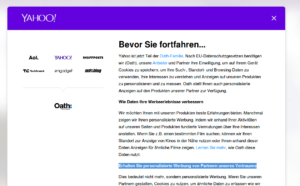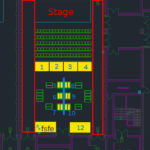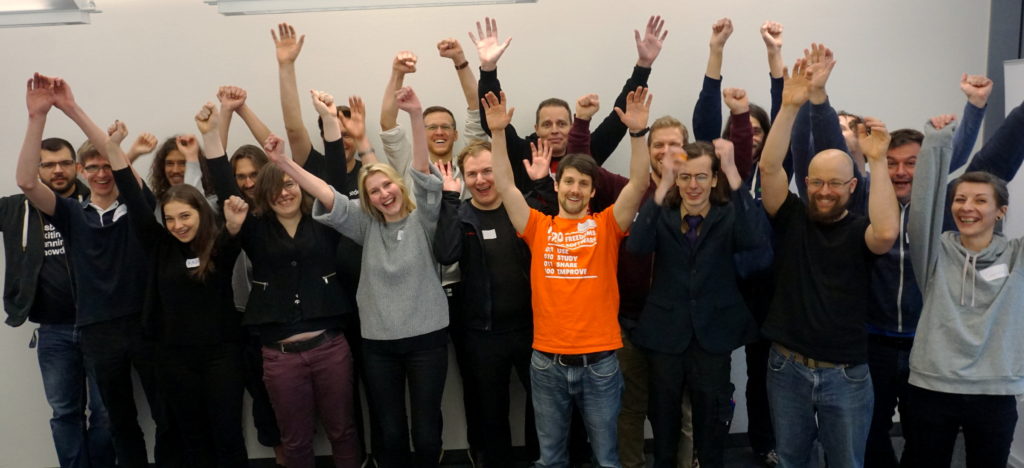This blog is no longer in use and there are no more updates. Existing content will stay. If you like to stay up to date about me and my work, consider following me on Mastodon or Twitter.
Dreierlei
about:freedom
Wie Barcelona eine offene „Smart City“ im Dienste des Gemeinwohls plant
Barcelona, die zweitgrößte Kommune Spaniens, arbeitet aktiv an einer „Smart-City-Agenda“, in welcher die Infrastruktur und Technologien einer modernen Stadt in einer Weise gestaltet werden, dass dabei die Bedürfnisse der Bürger*innen an erster Stelle stehen. Schlüsselelement dazu ist die Nutzung und Förderung von Freier Software und offenen Technologien. Ich habe für die Free Software Foundation Europe dazu ein Interview mit Francesca Bria, Chief Technology and Digital Innovation Officer von Barcelona, geführt über aktuelle Innovationen und Entwicklungen in der Stadt.
FSFE: In den letzten Monaten hast du an vielen Podiumsdiskussionen und Konferenzen teilgenommen, um über “digitale Souveränität” und ethische digitale Standards zu sprechen. Könntest du kurz erklären, was digitale Souveränität ist und welche Rolle Freie Software dabei spielt?
Francesca Bria: Heutzutage ist die Agenda für die smarte Stadt noch vorrangig technologiegetrieben. Viele Städte fallen in die Hände von IT-Unternehmen, die ihre eigenen privaten technologischen Lösungen durchsetzen wollen – anstatt bei den realen Bedürfnissen der Menschen und konkreten urbanen Problemen anzufangen. Dies führt dazu, dass Städte am Ende primär technologische Probleme lösen und sich in die Abhängigkeit proprietärer, nicht-interoperabler IT-Lösungen begeben, dabei in nicht-nachhaltige Geschäftsmodelle verwickelt werden.

Mein Auftrag ist es stattdessen, Daten und Technologien zu demokratisieren und deren Regulierung derart neuzudenken, dass sie den Menschen zugutekommen. Wir passen die Technologien an die wirklichen Ziele der Stadt an, zum Beispiel dem Recht auf Wohnraum, dem Energiewandel, der Erschaffung von öffentlichen Räumen, dem Kampf gegen den Klimawandel und die Förderung partizipativer Demokratie.
Digitale Transformation bedeutet nicht nur technologischen Wandel, sondern auch strukturelle, organisationelle und kulturelle Veränderungen. Wir müssen die digitale Revolution mit einer demokratischen Revolution verbinden. Für uns bedeutet dies, das Verhältnis zwischen Regierung und Bürger*innen neuzudenken, um sicherzugehen, dass die Bürger*innen die demokratische Kontrolle zurückgewinnen und vollständig an der Gestaltung der öffentlichen Ordnung mitwirken können.
“Wir möchten die Art und Weise verändern, wie Regierungen heutzutage funktionieren und sie offener, transparent, kollaborativ und partizipativ gestalten.”
Darum führt Barcelona ein großes Experiment für partizipative Demokratie durch, ein Mix aus weitreichender demokratischer Online- und Offline-Partizipation. Wir beziehen tausende Bürger*innen ein und geben ihnen die Möglichkeit, über eine Freie-Software-Plattform namens „Decidim“ neue Ideen und Regulierungen vorzuschlagen. Heute beinhaltet die Agenda unserer Regierung zu 70 Prozent Vorschläge, die direkt von den Bürger*innen stammen. Wir möchten die Art und Weise verändern, wie Regierungen heutzutage funktionieren und sie offener, transparent, kollaborativ und partizipativ gestalten.
Is there such a thing as anticompetitive public code?
Currently we are working on a brochure for our Public Money? Public Code! campaign, that we like to use as a help for politicians and decision-takers. The brochure shall help to clarify common misunderstandings about Free Software, show positive use-cases and of course the multiple benefits of using Free Software. One of these pages shall counter the claim that private actors cannot compete against Free Software published by the state, financed with public money. Find more information below or directly join the discussion in English or German on the FSFE Mailinglists.
One of the pages in our brochure about Public Money? Public Code! shall be dedicated to the topic “market distortion / anticompetition”. The point is that a main argument against publishing publicly financed software developments under a free licence is said to be “market distortion”. The argument says that private actors cannot compete against “software offered by the state free of charge” and therewith these publications are to be seen anticompetitive. On the other hand we use to argue that in fact Free Software fosters competition because there are a way less dependencies in the Free Software and Open Standards world.
Yahoo and its 321 “trusted partners” to share your data with
From tomorrow on all Europeans and their data shall benefit from the new General Data Protection Regulation. This puts a lot of Internet services currently in need to update their data and privacy regulations, to inform their customers about it and re-ask for their agreement on the new regulations. In my opinion this should be done every other year, because it sheds an interesting light on some of the companies pretending to do “business as usual”.
 To pick one, if you visit yahoo.com (now part of the Oath family) in these days from within Europe you are asked to agree to the updated privacy policies and to receive personalized adds delivered to you with the help of “trusted partners”. “Trusted partners” out of which each one of them comes with their own privacy policy again. Means, that if you agree to Yahoo, then you also agree to the terms of these “trusted partners” except you explicitly reject from doing.
To pick one, if you visit yahoo.com (now part of the Oath family) in these days from within Europe you are asked to agree to the updated privacy policies and to receive personalized adds delivered to you with the help of “trusted partners”. “Trusted partners” out of which each one of them comes with their own privacy policy again. Means, that if you agree to Yahoo, then you also agree to the terms of these “trusted partners” except you explicitly reject from doing.
If you then have a closer look who are these “trusted partners”, you will see two lists. One is the list of “trusted partners” who have signed the GDPR Transparency and Consent Framework. These are already 48 companies! Each one of them of course again comes with their own privacy policies. Means, by clicking ok you have already signed 49 different privacy policies, approximately written on more than a thousand pages.
Then, even worse, in the second list you find “additional partners” who have NOT signed the GDPR Transparency and Consent Framework but who have “mutual agreements” with Yahoo to “protect your data” … these “additional partners” are 273 companies!
273 individual companies with whom your data will or might be shared with and that have not signed the GDPR Transparency and Consent Framework. 273 companies with each one of them individual privacy policies, written on thousands and thousands of pages with none of them necessarily having to be in line with the new GDPR regulations.
In sum, by clicking ok to Yahoo now, you immediately have 321 “trusted partners” and their individual privacy policies that you share your online life with.
Unfortunately, Yahoo is just the tip of an Iceberg and similar arrangements are true for countless companies out there.
Well then. Thank you for nothing.
Attachments:
List 1: Trusted partners
List 2: Additional partners
Free Software Events in Europe in 2018
Recently, I asked our community to share those upcoming events (conferences / global action days / anything) in 2018 that are or should be in interested for the FSFE community. We now did put all these events in the FSFE-wiki-calendar, to help our community to organise activities (like a booth, talks, meet-ups…) around these events. As an overview, I publish the list of all these events so far in this blogpost.
If you know a Free Software and Open Source Software related event in Europe, happening in 2018, that is not yet listed here but that you think is in interest to the FSFE community, please leave it in this pad or contact me directly. All valid events will be imported from here into our wiki calendar.
Valid events do not need to be a conference, they can be install fests or other activities. But to be in interest for our community, they have to be for the general public and happen in Europe.
Events
Kann Freie Software auch Umweltschutz?
Zum heutigen I love Free Software Day möchte ich quasi einmal “über den Tellerrand hinausschauen” und dabei die Bedeutung Freier Software für die Reparierbarkeit sowie die Wieder- und Weiterverwendung (die “Nachhaltigkeit”) von Hardware beleuchten. Da Software kritisch ist für einen erfolgreichen Betrieb und der Weiternutzung von Hardware, kann Freie Software einen entscheidenden Beitrag zu Umwelt- und Verbraucherschutz leisten.
Immer deutlicher tritt in Erscheinung, dass proprietäre Software, dahinter stehende Geschäftsmodelle und geplante Obsoleszenzen von Software sich negativ auf die Reparierbarkeit, Wiederverwertbarkeit und die allgemeine Produktlebensdauer von Hardware auswirken. Nachdem bereits das Umweltbundesamt und das Europäische Parlament diese Gefahren erkannt haben, hat im Januar auch der Runde Tisch Reparatur (RTR) ein dazu passendes Diskussionspapier “Softwareobsoleszenz als Herausforderung für die Reparatur” veröffentlicht.
Der RTR ist ein Zusammenschluss verschiedener Zivilvertreter und -verbände und die Veröffentlichung greift direkt und indirekt die Bedeutung Freier Software zur Vermeidung von Produktobsoleszenz durch Software auf. Die dazu konsequent ausgeführten Argumente möchte ich in diesem Blogpost ausbreiten.
How to batch geotag your photos using Free Software and OpenStreetMap
If you like shooting and collecting pictures, you might be interested in geotagging your pictures. More and more software can use such geospatial metadata information for categorizing and visualizing these pictures, for example in an interactive map. Today, on I love Free Software day, I show you a way how to batch geotag your pictures with OpenStreetMap and Free Software only.
Geospatial metadata, together with time-stamps, seem to me to be the most important meta-information a picture can have. It is extremely helpful in organizing pictures, for example to cluster pictures that have been taken at the same location but at different times. Personally, I always need this data whenever I upload my pictures to Wikimedia Commons, as it asks me during the process about the geolocation of these pictures. Before, each time I had to look up the data individually on OpenStreetMap and fill in the information manually. Pretty fast, I got bored of this and I was looking for a way to write this information automatically into my pictures even before uploading.
One solution to this is a GPS-recorder built-in or attached to the camera. Unfortunately, very few cameras come with a GPS-recorder built-in and additional GPS-modules are a way too expensive for most hobby enthusiasts. Fortunately, there are software-solutions, that enable you to use just any other device which is able to capture GPS-tracks and then later merge this recorded geo-information with your pictures taken.
For sure, there are multiple ways to do this. In this blogpost, I will show you how you can do this with a smarthphone, OpenStreetMap and Free Software. All you need is:
- a smartphone running Android or a custom fork
- Osmand~
- a camera
- GPS correlate
FSFE Assembly at 34C3: Wir taten was
In December 2017, the Chaos Communication Congress moved for the first time onto the Messegelände Leipzig. The FSFE came along and as in recent years, our assembly attracted a lot of visitors. Together with EDRi, for the first time we have been setting up a cluster called “Rights & Freedoms” with our own stage for multiple sessions. Although there have been some organisational issues, this Cluster was a big success and during three days, it has been visited by thousands of people.
I am happy to see the FSFE assembly again growing every year and having the possibility to bring our message of Software Freedom to the people at the Chaos Communication Congress. The CCC is Germany’s biggest annual meetup of hackers and political activists and is “considered one of the largest events of this kind, alongside the DEF CON in Las Vegas” (wikipedia).
Free Software Assembly Europe at the 34C3 Chaos Communication Congress
This year, the assembly of the Free Software Foundation Europe will be integral part of the Cluster Rights & Freedoms. The cluster is formed together with our friends and other civil society organizations. During 4 days the FSFE will offer a public space for and by our members, friends and supporters to discuss, meet, hack and organise. Find an overview of our sessions and other specialties in this blog post. Always find the latest updates on our dedicated FSFE-assembly-page. Let’s put the hacking back into politics!
Location:

The Congress Center Leipzig is huge! You will find our assembly in the Cluster Rights & Freedoms. The cluster itself is filling Saal 3 / Hall 3, which is split half/half into the stage area and the assembly area. You find the FSFE assembly in the assembly area.
On the right side you see a supervision of the cluster with the stage on top and the fsfe-assembly on bottom-left.
Saal 3 / Hall 3 is in the CCL-building, which is the “small” building on top-left in this graphic. In a side view, Saal 3 is on top right of the CCL-building.
Our sessions:
Please note that all sessions will happen on the stage in the Rights&Freedoms-Cluster in Saal 3 in the CCL-building (see above to find the location), except the Free Software song sing-along-sessions that will happen directly at the FSFE assembly and the workshops that happen in dedicated workshop-rooms.
Do not forget to check the the 34C3-wiki page for details and the latest updates!
Report about the FSFE Community Meeting 2017
Two weeks ago we had our first general community meeting as an opportunity for all people engaged inside FSFE to come together, share knowledge, grow projects, hack, discuss and get active. Integral part and topic of the meeting was knowledge sharing of FSFE related tools and processes. Find some notes and pictures in this report.
For the first time, we we merging our annual German speaking team meeting this year with the bi-annual coordinators meeting into one bigger meeting for all active people of the FSFE community. Active people in this context means that invited was any member of any team, be it a local or topical one. All together, we met on the weekend of November 25 and 26 at Endocode, Berlin.
Integral part and topic of the meeting was knowledge sharing of FSFE related tools and processes. For this, we have had several slots in the agenda in that participants had the possibility to self-host a knowledge- or tool-sharing session that they are interested in. Or one in that they are an expert in and they like to share their knowledge. In a next step everyone could mark his own interest in the proposed sessions and based on that we arranged the agenda.

